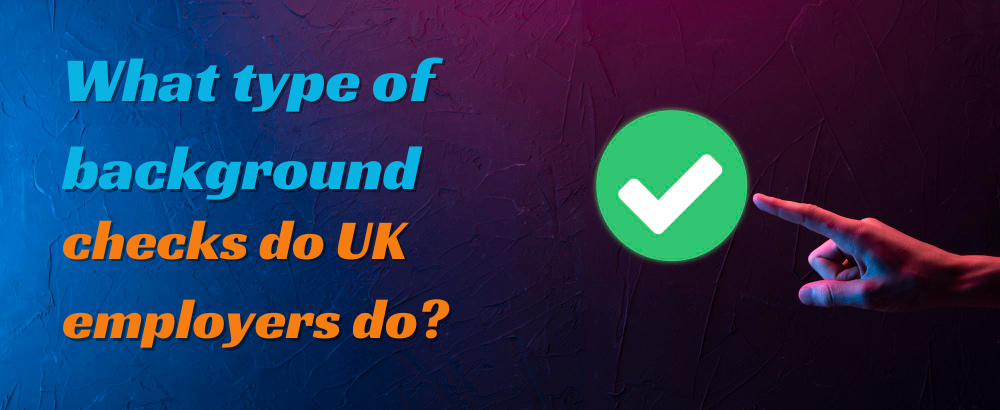What type of background checks do UK employers do?
- 1 Types of background checks do UK employers do
- 1.1 Identity Verification
- 1.2 Right-to-Work Checks
- 1.3 Criminal Record Checks
- 1.4 Employment History Verification
- 1.5 Qualification Checks
- 1.6 Credit Checks
- 1.7 Professional Reference Checks
- 1.8 Social Media Checks
- 2 Importance of Background Checks in Hiring
- 3 Conclusion
- 3.1 FAQs:
- 3.1.1 Are background checks mandatory for all UK employers?
- 3.1.2 What information can employers check during background checks?
- 3.1.3 How long does a background check process typically take?
- 3.1.4 Can candidates refuse background checks?
- 3.1.5 Do background checks include checking social media profiles?
- 3.1.6 What happens if discrepancies are found during background checks?
- 3.1.7 How can candidates prepare for background checks?
In Short:
- Background checks are vital for UK employers to verify candidate information, ensure legal compliance, and mitigate risks.
- They encompass various checks like identity, right-to-work, criminal record, employment history, qualification, credit, and reference checks.
- Conducting thorough background checks fosters a safe, productive work environment and supports informed hiring decisions.
Background checks are a standard part of the hiring process for many UK employers. These checks are conducted to verify the information provided by candidates, ensure they meet legal requirements and mitigate potential risks to the company.
While the specific types of background checks can vary depending on the industry and position, there are several common ones that employers typically perform in the UK.
Types of background checks do UK employers do
Identity Verification
Employers often start by verifying a candidate’s identity to ensure they are who they claim to be. This may involve checking documents such as a passport, driver’s license or national ID card.
Right-to-Work Checks
UK employers are required by law to verify that their employees have the legal right to work in the country. This involves checking relevant documents, such as visas or work permits, to ensure compliance with immigration regulations.
Criminal Record Checks
Many employers conduct criminal record checks, also known as Disclosure and Barring Service (DBS) checks, particularly for roles that involve working with vulnerable individuals or sensitive information. There are different levels of DBS checks, including basic, standard, and enhanced checks, depending on the nature of the role.
Employment History Verification
Employers may verify a candidate’s employment history to ensure accuracy and assess their suitability for the role. This can involve contacting previous employers to confirm dates of employment, job titles and responsibilities.
Qualification Checks
Employers may verify a candidate’s educational qualifications to ensure they have the necessary credentials for the role. This can involve checking academic certificates or contacting educational institutions to verify qualifications.
Credit Checks
In certain industries, such as finance or banking, employers may conduct credit checks to assess a candidate’s financial responsibility. This can help identify any potential issues that may impact their suitability for the role, such as financial instability or issues with debt.
Professional Reference Checks
Employers may request references from previous employers or colleagues to gain insights into a candidate’s work ethic, skills and performance. These references can provide valuable information that may not be evident from the candidate’s CV or interviews.
Social Media Checks
While not as common as other types of background checks, some employers may review a candidate’s social media profiles as part of the hiring process. This can provide additional insights into a candidate’s character, interests and behavior outside of work.
Importance of Background Checks in Hiring
Background checks are a crucial component of the hiring process for UK employers due to several key reasons:
- Legal Compliance: Conducting background checks helps employers comply with legal requirements, such as ensuring candidates have the legal right to work in the UK. Failure to verify this information could result in legal repercussions for the employer.
- Risk Mitigation: Background checks help mitigate potential risks to the company by ensuring that candidates do not have a criminal history that could pose a threat to workplace safety or the company’s reputation. For roles involving sensitive information or working with vulnerable individuals, such checks are especially important.
- Verification of Information: Background checks enable employers to verify the accuracy of information provided by candidates during the hiring process. This includes confirming employment history, educational qualifications, and professional credentials ensuring that candidates possess the necessary skills and experience for the role.
- Protecting Company Assets: Certain types of background checks, such as credit checks, help employers assess a candidate’s financial responsibility. This is particularly important in industries where employees have access to company finances or handle sensitive financial information.
- Cultural Fit and Character Assessment: Social media checks and professional reference checks provide insights into a candidate’s character, work ethic, and compatibility with the company culture. Employers can use this information to ensure that candidates align with the values and expectations of the organization.
- Reducing Turnover: By thoroughly vetting candidates through background checks, employers can reduce the likelihood of hiring individuals who may not be a good fit for the role or the company. This can help decrease turnover rates and associated hiring costs.
- Maintaining Reputation: Conducting thorough background checks demonstrates a commitment to due diligence and responsible hiring practices, which can enhance the company’s reputation among clients, customers, and stakeholders.
Background checks are not only a standard practice for UK employers but also play a vital role in ensuring legal compliance, mitigating risks, verifying information, protecting company assets, assessing cultural fit, reducing turnover, and maintaining a positive reputation. By conducting these checks responsibly and in accordance with data protection laws, employers can make informed hiring decisions that benefit both their organization and their employees.
Conclusion
In conclusion, background checks are an integral and multi-faceted aspect of the hiring process for UK employers. By conducting thorough background checks, employers can ensure legal compliance, mitigate potential risks, verify the accuracy of candidate information, protect company assets, assess cultural fit and character, reduce turnover, and maintain a positive reputation. These checks are essential for safeguarding the interests of both the company and its employees, contributing to a safe, productive, and reputable work environment. Employers must adhere to data protection laws and conduct background checks in a fair, proportionate, and responsible manner, with the candidate’s consent. Ultimately, investing in robust background checks is a strategic decision that supports informed hiring decisions and fosters long-term success for businesses in the UK.
FAQs:
Are background checks mandatory for all UK employers?
While not legally required in all cases, many employers opt for background checks to ensure compliance with regulations, mitigate risks, and make informed hiring decisions.
What information can employers check during background checks?
Employers can verify identity, right-to-work status, criminal records, employment history, educational qualifications, credit history, and professional references.
How long does a background check process typically take?
The duration varies depending on the type and extent of checks required. It can range from a few days to several weeks, especially for comprehensive checks like enhanced criminal record checks.
Can candidates refuse background checks?
While candidates can refuse, it may impact their candidacy as employers often use background checks to assess suitability for the role and mitigate potential risks.
Do background checks include checking social media profiles?
While not mandatory, some employers may review social media profiles as part of the hiring process to gain additional insights into a candidate’s character and behavior.
What happens if discrepancies are found during background checks?
Employers may seek clarification from the candidate and verify the discrepancies. Depending on the severity and relevance to the role, discrepancies may impact the hiring decision.
How can candidates prepare for background checks?
Candidates should ensure that the information provided in their application, including CV and references, is accurate and up-to-date. They should also be prepared to provide necessary documents and consent for background checks as required by the employer.


















